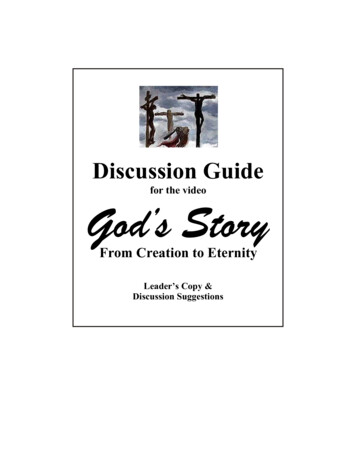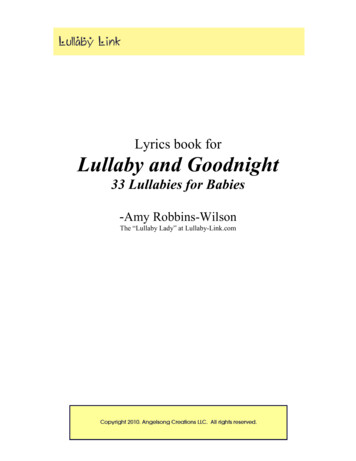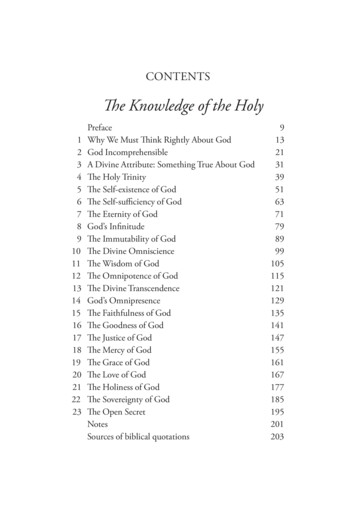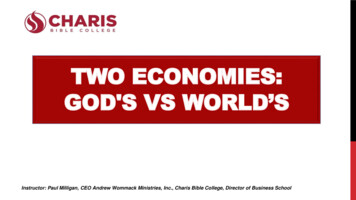
Transcription
REASONS FOR GODWHITE PAPERS CRITICAL CONCEPT SERIES VOLUME 2The reason for the Critical Concept series is that there are importanttopics not covered in our Transferable Concepts that are, for anynumber of reasons, of critical concern to us today.P OS TCA RDS F ROWHIM COTE RPAPIN TEHRS1Important concepts like this require more in-depth treatment, whichis a discipleship challenge when so few are reading books. And so wehave the Critical Concept series. Each article is roughly the lengthof a book chapter-about 16 pages. So it’s not a book, but it’s not apamphlet either.ORDER ONLINE AT CRUPRESS.COM 2010, CruPress, All Rights Reserved. CruPress.com
Critical ConceptSeriesV O L U M ET W OWHITEPAPERSReasons For God 2010, CruPress, All Rights Reserved. CruPress.com
ReasonsFor GodThinking Philosophically About Godby Gregory E. Ganssleintellectual culture. The reason I knowSuppose someone has died and we thinkthis is considered unquestionable dogmathat a murder may have been committed.is the reaction I get when I call it intoThe detective examines the scene andquestion. When someone says “You cannotbegins a long investigation. She seeks toidentify the responsible person by gathering prove the existence of God” I want to askfacts at the scene and determining in which “How do you know? You just met me! Howdo you know what I can do?”direction these facts point. Some of theevidence will point to the fact that theWhat do most people mean when theydeath was caused by some person withoutrecite this claim? Most people meanidentifying who the person is. Other linesthat I cannot provide a philosophicalof evidence may go far towards identifyingthe person. Sometimes what first appears to argument for the existence of God thatbe a promising line of evidence turns out to will convince all thinking people. It isimpossible, so the story goes, to providebe a dead end. Other times, some fact thatappears to be insignificant at first winds up an argument that will compel assent. Ifmy argument will not convince the mostproviding the key.ardent atheist, I have not proven God’sexistence. Since I cannot convince suchIt is unusual for a detective to find aan atheist to believe, my arguments dosingle piece of evidence that will providenot count as proof. If they do not countabsolute certainty about the identity ofas proof, what good are they?the criminal. Rather, detectives try tobuild what can be called a cumulativeI agree that I cannot provide an argumentcase. The various lines of evidence workthat will convince all thinking people. Buttogether to make it more and morewhat does this tell me? Does this tell mereasonable to think that a particularanything about God? No. This tells mesuspect is guilty. If the cumulative casemoreabout the nature of proof than itis strong enough, the suspect may bedoes about whether God exists. I cannotconvicted of the crime. The evidenceprovide an argument which will convinceneeds to establish his identity beyondeveryone, without a possibility of doubt,a reasonable doubt. It does not need tothat God exists. That is no problem. Youprovide absolute certainty.see, I cannot provide an argument for anyinteresting philosophical conclusion whichYou cannot provewill be accepted by everyone withoutGod’s existencepossibility of doubt.It is common for thinking people to insistthat it is impossible to prove the existenceI cannot prove beyond the possibility ofof God. In fact this claim has beendoubt in a way that will convince allelevated to the level of dogma in American 2010, CruPress, All Rights Reserved. CruPress.com
W H I T EP A G E Sphilosophers that the Rocky Mountains are really there asa mind independent object. I cannot prove that the entireuniverse did not pop into existence five minutes ago and thatall of our apparent memories are not illusions. I cannot provethat the other people you see on campus have minds. Perhapsthey are very clever robots.In fact, there is no interesting philosophical conclusion thatcan be proven beyond the possibility of doubt. So the factthat arguments for the existence of God do not producemathematical certainty does not by itself weaken the casefor God’s existence. It simply places the question of God’sexistence in the same category as other philosophicalquestions such as that of the existence of the external, mindindependent world and the question of how we know otherpeople have minds.It turns out that there is a great deal of similarity betweenthe strategy of the detective and the strategy we pursue asphilosophers. We do not expect one line of evidence by itselfto be strong enough to prove that God exists or to make thecase undeniably strong. Rather, different lines work togetherto strengthen or weaken the case for God’s existence. Wetry to assess all of the evidence to see in which direction itpoints. In this article, I will look at two lines of evidence thatprovide good reason to think God exists. There are, of course,other lines of evidence for the existence of God. Some ofthese are significantly strong. For the purposes of this article,however, I will focus on two. The existence of the universe isthe first line of evidence. The second is the nature of moralreality. These lines of evidence point to the existence of God,although they do not prove it.The Existence of the Universe points to God.Why is there something rather than nothing? Have you everthought about this question? It does not seem as thoughthere had to be something. If you consider most of the thingsyou see every day, they are all pretty much things that donot have to exist. In fact we can imagine very easily howthey might not have existed. If my parents had never met (Ifmy father had not gone to college in Boston, for instance) Iwould not have existed. My children would not have existedand there would be much less junk in our basement.Why do things come into existence? Well there are alwaysvarious reasons. Nothing comes into existence without somereason. Or, at least it seems like nothing comes into existencewithout some reason. Something coming into existence iswhat we call an event. It is something that happens. Anytimesomething comes into existence, an event happens. Someevents are cases of things coming into existence. Sometimesthey are changes in something already existing. Otherevents are the going out of existence of things. Events ofall kinds happen. In fact, events are the only things thathappen. Usually they are caused to happen by other events.Sometimes one event is both a change and a coming intoexistence. For example, if you make a hunk of modeling clayinto a statue, you cause a change in the shape of the hunkof clay and at the same time you cause the statue to comeinto existence. So, many of the things we see are the kinds ofthings that come into existence. Part of any complete answerto the question of why something exists will include thethings that caused it to come into existence.Think about the question of why there is anything at all. Letus begin to think about this question by taking the universeas a whole. Why is there a universe in the first place? If theuniverse came into existence, then part of the answer to thisquestion involves the event that brought it into existence. Ifthe universe did not come into existence (that is, if it alwaysexisted) then the answer to why it exists will not involve anycause that brings it into existence.You can probably see where I am heading. If we can showthat the universe came into existence, then we have tothink about what caused it to come into existence. Thismay be a clue to the question of whether or not God exists.Let us follow this line of thinking. Things that come intoexistence, we have said, are caused to exist by somethingelse. Let’s put this claim out in the open so we can see whatmight follow from it.1. Whatever comes into existence is caused to exist bysomething else.There are lots of things that come into existence so we willhave lots of causes. It will not do simply to have a pile ofcauses randomly scattered about. We need to have chains ofcauses or series of causes. The coming into existence of thestatue was caused by the clay being molded into the rightshape. The molding of the clay was caused by the fingers andpalms of the person exerting the right kind of pressure. The 2010, CruPress, All Rights Reserved. CruPress.com3
W H I T EP A G E SWhy is there something rather thannothing? Have you ever thought abouthands exerting the pressure was caused by the arm musclesand nerves operating in the right way. The operating of themuscles nerves was caused by the person himself. You cansee that we get a series of causes. Notice that in the seriesof causes, some involve changes and some involve thingscoming into existence.How far back will a series of causes go? Either it can goback forever or it cannot. In other words, either the seriesof past causes is infinite or it is finite. If it is infinite, thenfor every part of the series, there is something else in theseries that is previous to it and which is its cause. If it isfinite, then there is some point where the whole series began.In other words, the series itself came into existence. Wecan capture these thoughts and what follows from them byforming an argument:1. Whatever comes into existence is caused to exist bysomething else.2. If the series of past causes is not infinite, then the seriesof past causes came into existence.3. There cannot be an infinite series of past causes.4. Therefore, the series of past causes came into existence.5. Therefore, there exists a cause for the series of past causesand this cause did not itself come into existence.How do we think about this argument? Does theconclusion follow from the premises? It is a deductivelyvalid argument. In other words, if the premises are true, theconclusion is true. You can see that there are no loopholes.If everything that has come into existence is caused to existby something else and if this chain cannot be infinite, theremust be some first cause that did not come into existencein the first place and thus it did not need to have somethingelse cause it to exist.Are the premises true? Let us take them one at a time. Whatof premise one? It seems as though things that come intoexistence are caused to exist by something else. After all,nothing can cause itself to come into existence. In order tocause itself to come into existence, something would have toexist before it exists. We all know that nothing exists beforeit exists. So it looks like premise one turns out to be true.this question?Premise two seems to be true as well. If the series of past causesis not infinite, then the series of past causes came into existence.What it means to say that the series of past causes is notinfinite is that it began somewhere along the way. If it nevercame into existence, then it always was and it is infinite.This leaves us with premise three. There cannot be an infiniteseries of past causes. Is this statement true? Is the series of pastcauses infinite? Can the universe have an infinite past? Thereare good reasons to think it cannot. That is, there are goodreasons to think that this premise is true. First, there arephilosophical reasons to think the past cannot be infinite.Second, there are scientific reasons that support this view.The philosophical support for this premise is a bitcomplicated so I will state it right out and then explain it thebest way I know how. The past cannot be infinite because itis impossible to complete an infinite series by successive addition.What does this claim mean? Think of this mathematicalquestion. Why is it impossible to count to infinity? Theproblem is not that you get bored with the countingprocedure or that you eventually grow old and die. Theproblem is much bigger than these problems. It is impossiblebecause, no matter how long you count, you will always beat a finite number. It is impossible to count to infinity even ifyou count by tens or thousands or millions. It is impossibleto complete the task of counting to infinity. Once we getthis in our minds, we can see two things, I think. We cansee what I mean when I say that it is impossible to completean infinite series by successive addition and we can see thatthere are good reasons to think that it is actually impossibleto complete an infinite series in this way.One thing we must notice about the past is that it iscomplete. The series of past events is complete. This claimmeans that the entire series of past events ends now. It endstoday. Tomorrow is not part of the series of past events. (Itwill be part of the past series, of course, but it is not yet part 2010, CruPress, All Rights Reserved. CruPress.com4
W H I T EP A G E Sof it.) The series of past events does not extend into the future.It is complete at the present. If it is impossible to completean infinite series by successive addition (as it is impossibleto count to infinity) the past cannot be infinite. If the pastis finite, that is, if it had a beginning, then the universe hada beginning. We have good philosophical reason, then, toreject the claim that the universe has always existed.How good is this line of reasoning? I do have to admit thatthere are smart philosophers who are not persuaded by it.Some think that if we have an infinite amount of time, itmight be possible to complete an infinite series by successiveaddition and that it is not, therefore, impossible for thepast to be infinite. I do not think that this challenge worksbecause I think completing an infinite duration of time isimpossible for the same reason that counting to infinity isimpossible. Yet if the past is infinite, then an infinite durationof time has elapsed.There are some scientific reasons as well as philosophicalreasons to think that the series of past causes is notinfinite. I will not develop these. Rather, I will simplypoint them out. First, Big Bang theory seems to supportthe claim that the universe began to exist. If the originof the universe was anything like what current theoriesin physics claim, the universe is not infinitely old.Rather, it had a beginning. Of course, there are lots ofdisagreements within or between current theories aboutthe origin of the universe (and theories change with newideas and new evidence) so it is wise not to rest too muchon what looks like scientific support for the idea that theuniverse had a beginning.The second scientific reason is the second law ofthermodynamics. The second law of thermodynamics isclaim that the amount of usable energy in any closed systemalways decreases. Another way to state this law is that the 2010, CruPress, All Rights Reserved. CruPress.com5
W H I T EP A G E Sdisorder in any system (entropy)always increases. The second law ofthermodynamics explains why youneed electricity to run your refrigeratorand gas to run your car. Without asupply of energy, these things will stoprunning and then you will have to stayhome on Saturday night and drinkwarm coke. Now let us think about thesecond law and the universe as a whole.The total amount of usable energy ina closed system always decreases. Aclosed system is one that does notget any extra energy from outsideit. Since the universe, if there is noGod, is a closed system, it cannotbe infinitely old. The fact that therestill is usable energy in the universeshows that entropy is not complete.Therefore, these physical processesmust have begun some finite amountof time ago.We can see that we have goodphilosophical and scientific reasonsto reject the idea that the universehas always existed. As a result, wehave good philosophical and scientificreasons to think that the premise weare discussing (“There cannot be aninfinite series of past causes”) is true.If it is true, then it looks as though theargument is a good one. Remember,we already agreed that the first twopremises are true. So we have givena good argument for the claim thatthe universe was caused to exist bysomething outside it and that this thingitself did not itself come into existence.Must the Universe havea cause?The argument we are discussing aimto support the claim that the universewas caused to exist by somethingoutside of it that did not itself comeinto existence. I want to look over thatargument one more time. I want tolook at it again to make sure we havenot been too hasty in concluding thatthe universe must have been caused toexist by something outside of it.Even if there are good reasons to believethat no series of causes can be infinite,perhaps there is another weak spotin the argument. I think the weakestspot is the second premise. (Whatevercomes into existence is caused to exist bysomething else.) We saw that nothingcan cause itself to come into existence.Perhaps, there is another alternativethat we did not consider. Maybe it ispossible for something to come intoexistence from nothing without anycause whatsoever. Can a thing just popinto existence with absolutely no cause?It is safe to say that we do not expect,in our every-day lives, to encounterthings that have popped into existencewithout any cause whatsoever. We fullyexpect there to be causes for things.This expectation is pretty deep andconstant. It is worth asking if there anyexceptions at all to this expectation.Second, could the universe itself besuch an exception?The reason we want to keep thesetwo questions separate is thathaving something that counts asan exception will not affect ourargument very much. Even if it isreasonable to think that there aresome exceptions, our argumentcould be adjusted to take account ofthese things. In order to show thatour argument fails, we need for theuniverse as a whole to be an exceptionto our deep and constant expectation.What kinds of things might happenwithout any cause? Physicists tell usthat quantum events can do so. Aquantum event involves something likethe movement or spin of a very smallsub-atomic particle. Current quantumtheory indicates that some particles canjump from one quantum level to anotherin a way that is uncaused and nototherwise determined. If they are correct,then some events occur without beingcaused to occur. This discovery is prettyamazing since it overthrows the viewof the universe that most people heldthroughout the first three hundred yearsof modern science. Some things canhappen without being caused to do so.These facts about quantum physicsundermine the premise we arediscussing in the form we are thinkingabout it. Remember, the premise claimsthat, “Whatever comes into existenceis caused to exist by something else.” Ifthe physicists are right about quantumtheory, this premise is false. Thereare states that do come into existencewithout being caused to come intoexistence. It still remains to be seenwhat these facts about quantum physicshave to do with whether the universeitself can come into existence without acause. The universe, after all, is not verylike the quantum states of sub-atomicparticles. They are typically quite smalland the universe is a very big thing.Simply pointing out that some eventdoes not require a cause will not give usreason to suppose that we do not needa cause for the universe. It does give usa reason to reword the premise, though.Perhaps we should say that “Really bigthings that come into existence arecaused to exist by something else.” Ifwe think the phrase “Really big things”does not sound technical enough we 2010, CruPress, All Rights Reserved. CruPress.com6
W H I T EP A G E Smight try something like, “Supra -atomic things and eventsthat come into existence are caused to exist by somethingelse.” A “supra-atomic” thing is the opposite of a “sub-atomic”thing. Sub-atomic things are smaller than atoms. Supraatomic things are bigger than atoms.Granting the sub-atomic exceptions to our expectationsabout causes, are we confident that supra-atomic thingsthat come into existence are caused to exist? Well, I wantto hesitate at this point. All of the supra-atomic things Iencounter on a daily basis seem to be the kinds of thingsthat are caused to come into existence. I do not, however,encounter a lot of things that are like the universe as awhole. In fact, I do not encounter the universe as a wholeat all. I only encounter small chunks of it at a time. CanI go from all the different things I do encounter that arecaused to come into existence and conclude that this otherthing that I do not encounter also is most likely caused tocome into existence? Remember, we have already agreedthat the universe as a whole came into existence. Herewe are worried about whether it was caused to come intoexistence. The universe has a lot in common with theeveryday things that are caused to come into existence. Itis big and it is physical, for instance. It is not somethingabstract like a number. It differs in striking ways from theordinary things, however. For example, it exists but doesnot exist anywhere. It is spatial but it is not in space. Itwould be more accurate to say that space is in it. Similarlythe laws of physics do not act on it as a whole. They actwithin it. Furthermore, although the universe is a verybig thing now, it was not always so big. At the momentand slightly after the big bang, the universe was verysmall. In fact, it was something, at least for an instant,about the size of a sub-atomic particle.So I have to grant that it is at least possible that the universepopped into existence without a cause. I can’t see strongenough reason to make the claim that such a thing wouldbe either impossible or so unlikely that it is irrational tobelieve. I think that it is still more reasonable to hold thatthe universe was caused to exist than that it popped intoexistence without a cause, however. The universe as a wholeis a physical object that is pretty big and has lots of differentproperties. Even though it began quite small, apparentlyall of the matter and energy present in the universe todaywas concentrated in that small object. The history of theuniverse is a history of the expansion of all of that matterand energy. So, although it was briefly similar in size toa sub-atomic particle, its properties were quite different.Granting that it is possible that the universe might havecome into existence without a cause, it seems difficult toclaim that it actually was uncaused unless you have somereason to think that this is what happened. There may bereasons for thinking that the universe came into existencewithout a cause, apart from its relatively small degree ofsimilarity to a sub-atomic particle. I do not know what anyof the reasons could be.We have seen that we have pretty good reasons to thinkthe universe came into existence, but we have also seenthat we cannot rule out the possibility that it came intoexistence uncaused. I have suggested, however, that it is morereasonable to reject this alternative than to accept it. If wedo so, then we conclude that the universe was caused to existby something outside it. There was a first cause. This causeexisted eternally. It initiated the big bang and caused theuniverse to come into existence.Must the first cause be God?Supposing, then, that there is a first cause, why think that thecause is God? This question is important. Showing that therewas a first cause is not enough to show that God exists. It mayseem obvious that if there was a first cause, that cause wasGod. This step, though, needs some justification. I do wantto point out briefly, however, some reasons to think that thisinference is a good one. First, the first cause caused the entireuniverse to come into existence. Because of this fact, we knowthat the first cause is not part of the universe. The first cause isnot physical. Everything physical is within the universe.There is good reason to think that the first cause is a person. Itis not simply a force but it must have aspects of personhood;namely, that it wills. It acts. The claim that the first causeis a personal agent provides the best answer to the questionof why the universe began to exist when it did. Why notsooner? Why not later? Suppose the universe was caused tocome into existence thirteen billion years ago. The questionthat naturally arises is, why did it happened then and notsome other time? Why did it not come into existence fiftybillion years ago? If we ask these kinds of questions aboutevents within the universe, we can always come up with areason. The event happened when it did because it was not 2010, CruPress, All Rights Reserved. CruPress.com7
W H I T EP A G E SAn evolutionar y theor y of moralit y mayexplain why we feel it ’s wrong to tor tureuntil then that all the conditions were gathered at the rightplace for it to occur. Once all of the conditions are gatheredtogether, the event happens.If the universe was caused to come into existence, all ofthe necessary and sufficient conditions for it coming intoexistence were present thirteen billion years ago. Why didthe universe not come into existence fifty billion years ago?If all of the conditions were present thirteen billion years ago,they would have been present fifty billion years ago.We can make a distinction between types of causes,here. The distinction is between event causation andagent (or personal) causation. Most causes are cases ofevent causation. One event causes another. Most eventsare caused by other events. It seems that some events quantum events - are not caused at all. Others, I want toclaim, are caused but not caused by other events. Theyare caused by persons. Personal agents are able to initiatevarious series of events simply by willing them. If you raiseyour arm in the air, you initiate the action by willing it. Allof the conditions are present, but the event does not occurwithout the trigger of your intention. If the universe wascaused to exist by something outside it, it makes sense thatthat thing will involve the will of a person.In this section, we have argued that the universe cameinto existence and that it was more likely to be caused tocome into existence and that it was caused to do so by aperson. How good is this argument? Is it a proof? I donot think that this argument comes close to being a proofthat carries mathematical certainty. We have not shownthat it is impossible that the universe popped into existencefrom nothing without cause. Nor have we shown that thefirst cause has to be God. We have argued that it is morereasonable to hold that it has a cause and that this cause is anon-physical personal agent. So it seems that this argumentis fairly strong, as philosophical arguments go. The existenceof the universe points to the existence of God.Moral Facts Point to GodMost people today think there are certain actions that aremorally wrong. For example, most people think that it iswrong to torture a cat to death just for fun. The fact thatsuch an action is wrong can be called a moral fact. Most factsare about the way the world is. Moral facts are about the waya cat. It explains moral feelings, butcannot explain that it ’s really wrong totor ture the cat.the world ought to be. It ought to be the case that no humanbeing tortures a cat to death just for fun. Whether or not anyhuman being ever actually tortures a cat in this way is notwhat makes the moral fact a fact.Although most people believe in moral facts, many are notcomfortable with them. They are too odd. Several of themore popular ideas about morality are attempts to tamemoral facts. Not all of these ideas are strategies to getrid of moral facts altogether but, for example, relativismreduces the moral fact to facts about the preferences ofindividuals or cultures. They are still moral facts butthey are tamed. There are lots of good reasons to rejectrelativism in its various forms.Others defend the idea that morality can be explainedthrough a Darwinian sort of analysis. What an evolutionarytheory of morality does explain (that is, if it is true) is whywe may feel like it is wrong to torture a cat just for fun. Itexplains moral feelings but it cannot explain that it is reallywrong to torture the cat. Some people think that if weexplain the moral feeling, we explain away the moral fact.In other words, they think that moral facts reduce to moralfeelings. There are no moral facts apart from facts aboutour moral feelings. The evolutionary theory of moralityitself does not show that all there is to morality is ourmoral feelings. We need an argument for this claim. Sucharguments are difficult to make plausible.Another reason to reject the Darwinian theory of moralityis that there is no evidence that it is true. We may haveevidence that prehistoric people did travel and hunt in groupsbut we do not have (and we cannot have) any evidence thatour sense of moral obligation comes from the feelings ofloyalty and guilt and so forth. This claim is not the sort ofclaim that lends itself to physical evidence. So while thetheory sounds like an established scientific theory, it is reallya philosophical claim in disguise. 2010, CruPress, All Rights Reserved. CruPress.com8
W H I T EP A G E SOne other point worth considering is that if moralityoriginated because it had survival value- that is if theevolutionary theory of morality was true- what do you andI do now? We are in a difficult spot. You see, the humanrace has survived. Nothing that you and I do will makeany difference to its future survival. If the whole purposeof morality is to help us survive and you and I know thatthis is the whole purpose, then why should we be moral?Why should we be or feel obligated to act a certain way? Ifthe evolutionary theory of morality is right, then I do notthink there is a good answer to this question. The reasonfor morality has been fulfilled and it will continue to befulfilled whether or not we act morally.So we can see that some of the attempts to tame moral facts are nottoo promising. In what follows, proceed on the assumption thatthere are moral facts, since most people think there are. I will arguethat the existence of moral facts points
provide good reason to think God exists. There are, of course, other lines of evidence for the existence of God. Some of these are significantly strong. For the purposes of this article, however, I will focus on two. The existence of the universe is











